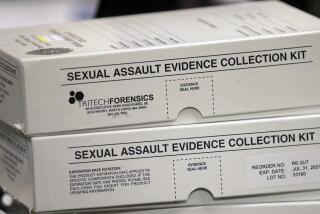Clinton Orders Tracking of Sex Offenders
WASHINGTON — Vowing to prevent sexual predators from repeating their crimes, President Clinton signed an order Saturday creating a nationwide computer network allowing police to track sex offenders anywhere in the country.
The plan, which the president announced in his weekly radio address, builds on a new law that requires released sex offenders to register with their state governments and requires the states to notify communities when an offender moves into the neighborhood.
The latest step authorizes the FBI to compile each state’s list into a nationwide directory available to law enforcement agencies across the country. He said the new network will be in operation in about six months. It will be an interim step in the establishment of a permanent National Sex Offender Registry, due to be completed by mid-1999.
“For the very first time, a police officer in Cleveland could get information about any known sex offenders in Cleveland, even if the crimes were committed in New York or Los Angeles,” Clinton said. “This national registry sends a simple message to those who would prey on our children: The law will follow you wherever you go.”
The announcement is part of a White House effort to solidify Clinton’s support among middle-class voters and to deflect recent criticism, focused on his approval of tough welfare restrictions, that he is allowing the victimization of children.
Two months ago, he announced that he was directing Atty. Gen. Janet Reno to develop the sex-offender registry plan. And Saturday he made the next step--its implementation--the subject of another formal radio address announcement.
Clinton’s Republican opponent, Bob Dole, complained that the idea was also borrowed from the 1992 GOP platform.
*
“Bill Clinton has mastered the game of follow the leader--Bob Dole,” Republican campaign spokeswoman Christina Martin said.
But for Clinton, the sex-offender order fit smoothly into a series of measures, leading into the Democratic National Convention, that targeted tobacco sales to teenagers, raised the minimum wage, extended health insurance coverage and changed the welfare system.
Some civil liberties organizations have complained that the offender-registration requirements impose additional punishment on criminals who have already served their time. But Clinton said the procedure is needed because sex criminals are so often repeat offenders.
“Study after study tells us that they often repeat the same crimes,” the president said. “That’s why we have to stop such offenders before they commit their next crime, to make our children safe and give their parents peace of mind.”
A Justice Department study, released Saturday, said sex offenders are more likely than other criminals to repeat offenses and that those convicted of child molestation are twice as likely to commit the same crime again as sex offenders who attacked adults.
*
The report cited a 15-year study by the California Department of Justice which showed that nearly 20% of 1,362 sexual offenders arrested in 1973 were rearrested for a later sexual offense.
Associate Atty. Gen. John Schmidt said an estimated 250,000 people are either wanted for sex offenses or have a criminal record of such crimes, the Associated Press reported. Schmidt said that once the national registry is completed, additional criminals may be identified.
The registry is expected to cost about $2 million, with states incurring an additional but relatively modest cost, he said.
More to Read
Sign up for Essential California
The most important California stories and recommendations in your inbox every morning.
You may occasionally receive promotional content from the Los Angeles Times.










